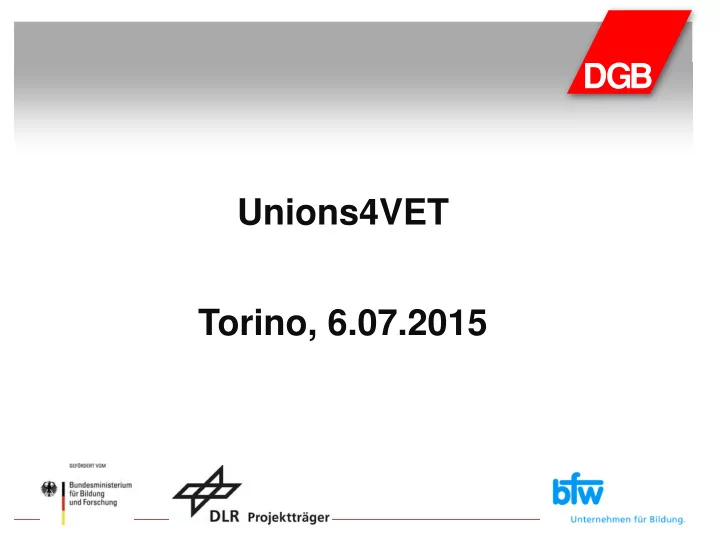

Unions4VET Torino, 6.07.2015 1 1
Unions4VET provides comprehensive consulting and educational services of modular trainings, higher vocational qualifications as well as recognised and approved education and training has approx. 1.700 employees nationwide is represented by approx. 200 branch offices all over Germany around 45.000 participants listed per year approx. 30 projects are carried out annually with national and international partners to develop innovative products and business segments as well as to promote the transfer draws on an extensive network of practical cooperations with multiple public institutions, businesses, non-profit organizations, associations and research institutes 2 2
Unions4VET Initial status 1. Objectives 2. Approach 3. Implementation – Inception phase 4. Implementation - Piloting 5. Delivery of results 6. Project references 7. 3
Unions4VET 1. Initial Status Following the Joint Declaration on the European Alliance for Apprenticeships, the DGB has submitted concrete commitments via ETUC: To support the alliance - To reform, develop and enhance apprenticeship systems - To raise awareness on the added value of apprenticeships among - emloyers and youth To disseminate information and take action on more attractive - conditions for corporations and apprendices 4 4
Unions4VET 1. Initial Status ETUC´s recommendation on apprenticeship and work-based learning Apprenticeship schemes should be clearly defined on the basis of the proposal made by CEDEFOP, the European Centre for the Development of Vocational Training: ´ ….systematic , long-term training alternating periods at the workplace and in an educational institution or training institutions. The apprentice is contractually linked to the employer and receives remuneration (wage or allowance). The employer assumes responsibility for providing the trainee with training leading to a specific occupation’ 5
Unions4VET 2. Objectives To strengthen the cooperation of trade unions with partner organisations in Portugal, Italy, Greece, Slovakia and Latvia in the field of vocational education and training (apprenticeships) Active involvement of social partners in the existing and planned initiatives for vocational training cooperation Strengthening and consolidating cooperation with the partner trade unions and expansion of networking with relevant organisations in the countries Initiation of learning processes and training dialogues to create a quality framework and provide minimum standards 6
Unions4VET 3. Approach The project initiative has been set up to promote sustainable trade union cooperation in vocational training and to integrate them into dialogue processes of the relevant actors on the ground. - Networking and promoting cooperation in the field of vocational education and training (apprenticeships) with trade unions in partner countries - Specification of pilot projects and the exchange of peer review based on the results achieved with all partners - Preparation and transfer of results 7
Unions4VET 4. Implementation – Inception VET (apprenticeship) training dialogue with trade unions and partner organisations Identification of experts for VET (apprenticeship) training and networking with trade union stakeholders Identification of German experts for VET (apprenticeship) training seminars in Italy and Portugal (trade unions, employers, chambers) Building networks and support structures Identification of needs on the ground and possible future pilot projects seminar planning 8
Unions4VET 5. Implementation – Piloting Strategic Issues Involvement of the trade union - What role do the trade unions play in supporting apprenticeships in your country? - What are the key issues for trade unions around apprenticeships in your country? - Are any strategies on apprenticeships planned by the trade union Current training situation - What are the most important challenges in terms of cooperation between trade unions, and other bodies (e.g. public institutions, companies and educational institutions) on apprenticeships? - To which extent are training programs in line with the actual professional needs? - To which extent are practical training designed? - How do emlpoyers´associations support apprenticeship policy? - Which quality standards are applicable? - What kind of reforms are planned? 9
Unions4VET 5. Implementation – Piloting Development of instruments and tools Minimum standards: duration of trainings, place of cooperation, legal status of trainees (aprendices), quality, training personnel, apprendiceship as the foundation for further education Steering the dual apprendiceship system: legal regulations and planning procedures, inclusion of social partners, vocational education schools and science, vocational training dialogue at national, regional and local level, sector dialogue "Train-the-Trainer": development and implementation of training modules Development and proposition of own training modules for tutors and trainers in enterprises Seminars in Italy and Portugal 1
Unions4VET 6. Delivery and transfer of results Formulation of recommended actions (integration European Alliance for Apprenticeships Preparation and dissemination of results to the German Federal Ministry of Education and Science, ETUC and public Closing Conference 1
Unions4VET 7. Project references European Project sponsored by the German Federal Ministry of Education and Science Duration: 1.6.2015 – 31.5.2017 Project management: Bfw in close cooperation with DGB Partner countries: Portugal, Italy, Greece, Slovakia and Latvia 12 1
Kontakt: Hans Ulrich Nordhaus DGB Federal Executive Committee Department – Educational Works and Policies Tel.: 0049-30 - 24060 - 382 E-Mail: ulrich.nordhaus@dgb.de Dr. Monika Stricker and Kurt Pichler bfw-Unternehmen für Bildung Tel.: 0049-2104 – 499-214 E-Mail: stricker.monika@bfw.de andpichler.kurt@bfw.de Allianz für Aus- und Weiterbildung, DGB Bundesvorstand, Abteilung Bildungspolitik und Bildungsarbeit 13
Recommend
More recommend